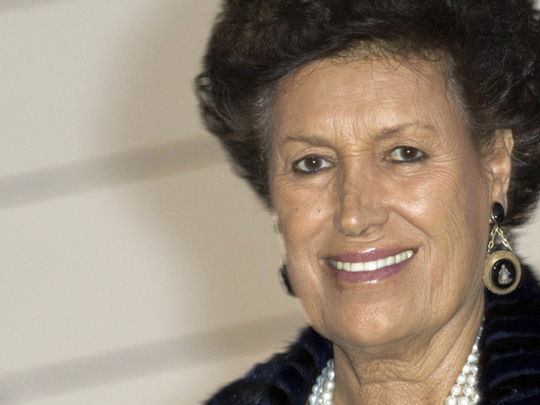
Carla Fendi, one of five sisters who transformed the family leather goods business into a luxury fashion house that was one of Italy’s first to win global renown, has died in Rome following a long illness. She was 79.
Fendi died on Monday and the Rome-based fashion house confirmed her death in a statement on Tuesday, expressing pain for the loss and gratitude for her continued contributions.
“She was for all of us a source of inspiration and an example of dedication, culture of work and sensitivity to beauty,” the company said.
Carla’s parents, Edoardo and Adele Fendi, founded the company in 1925 with a store fronting the workshop in via del Plebiscito in Rome’s historic centre, but it was with the next generation that surged it to prominence as ready-to-wear took off in Italy.
The five Fendi sisters — Paola, Anna, Franca, Carla and Alda — took control of the family business after their father’s death and opened their first Fendi store in another location in Rome’s historic centre in 1964.
A year later they hired a young designer named Karl Lagerfeld who helped catapult the Italian brand into global fame by elevating fur from staid symbols of luxury to fashion pieces, acquiring lightness and softness, becoming easier to wear and less pompous.
Under Lagerfeld’s direction, Fendi arguably became the most famous furriers in the world. The brand also helped revolutionise leather handbags in the 1990s, making them softer and less rigid, while Fendi’s niece, Silvia Venturini Fendi, invented the famed Fendi baguette bag inspired in shape by the traditional French loaf.
“We said to ourselves: ‘today women are working. We need to change everything,’” Fendi was quoted by La Repubblica as saying. “No one had yet thought of the cross-body bag, practical, comfortable, soft, light.”
The Fendi fashion house eased up on fur as pressure from animal rights activists diminished the market. While never abandoning completely their heritage, the brand started placing fur as the lining of silk coats, or weaving it into fabric or making patchwork pieces, while putting more emphasis on its accessories along with its clothing lines.
Each sister had her role, and Carla Fendi, as Fendi president, was long the family business’ public face, becoming known as the “signora della moda,” or “lady of fashion.” They sold to the French luxury group LVMH in a deal that was completed in 2001, and she maintained her role as president until 2008. She was honorary president until her death.
Even as Milan became the centre of Italian ready-to-wear, the Fendis maintained their ties to their beloved, native Rome, maintaining their headquarters in the Italian capital and sponsoring the renovation of famed landmarks, like the Trevi Fountain.
Lagerfeld remains the brand’s womenswear designer, along with his other fashion pursuits at Chanel and his own brand, while Silvia Venturini Fendi, daughter of Anna, is the brand’s creative director. Her latest menswear collection, for spring/summer 2018, showed on Monday, hours before her aunt’s death, hewed to the brand’s tradition of lightness, with transparent looks, and even included a short summer fur.
“For her nothing was impossible,” Venturini Fendi told RAI state television. “The challenges that she always confronted, also as a pioneer in her field. She always had a love of beauty.”
Besides her contributions to fashion, Carla Fendi will be remembered for her support of Italian culture, including the Spoleto Festival in Umbria.
“Fashion (and culture) have lost a star,” La Repubblica wrote on Tuesday. Culture Minister Dario Franchescini remembered her as “a cultivated and sensible woman who was a major patron of the arts.”
Fendi was long married to Candido Speroni. People close to the designer say her health faltered after he died three years ago. Fendi’s funeral will be on Thursday at the Chiesa degli Artisti in Piazza del Popolo in Rome.








